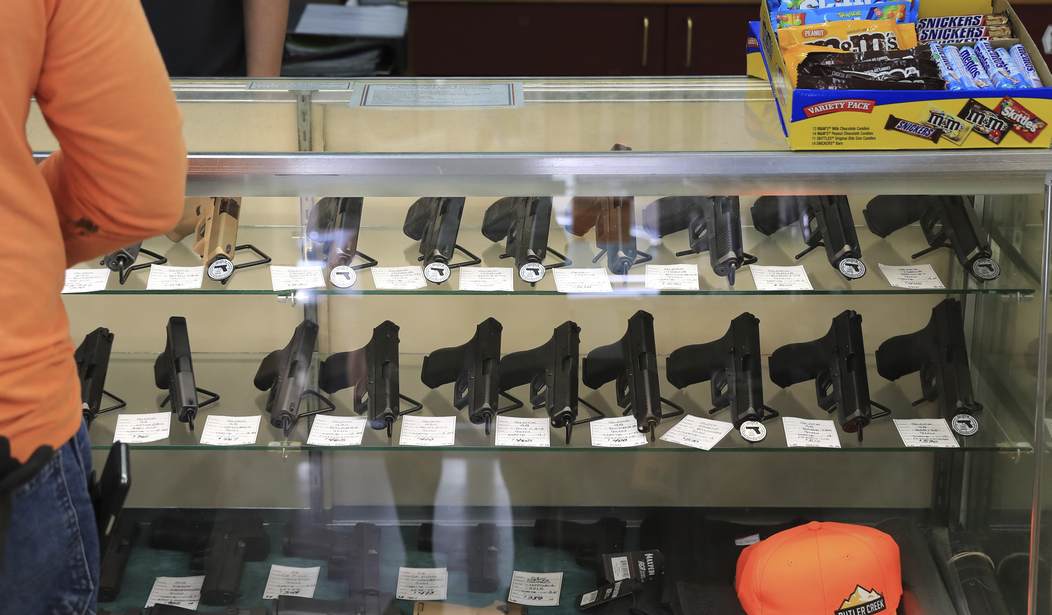Starting on Sunday, most Delaware residents hoping to purchase a handgun will be forced to apply for permission from the Delaware State Police, including providing documentation that they've taken a firearm safety course complete with live-fire training and submitting their fingerprints. Residents with a valid carry license are exempt from the permit-to-purchase provisions, but those without a carry license can expect to wait up to 30 days for the police to give them the green light to purchase a gun, even if they clear a background check within minutes.
On Thursday, U.S. District Judge Maryellen Noreika heard more than an hour's worth of oral arguments in a lawsuit filed over the new gun control law, with plaintiffs asking the judge to slap an injunction on the scheme while the litigation plays out. Noreika did not issue a decision from the bench. Instead, she instructed both sides to submit follow-up briefs on the issue, which were due at noon today.
One of the arguments brought up by the plaintiffs, which Noreika grilled attorneys about, is that the new law would leave applicants with little recourse if the state does not respond to them within 30 days.
"The enforcement date for the Permit Bill should be extended until the State can demonstrate that eligible persons such as the Declarants can obtain a permit before the Permit Bill is enforced," said a complaint filed by seven plaintiffs, including Attorney Thomas S. Neuberger.
The new law (referred to as "Permit Bill" in the complaint) gives Delaware 30 days to review a permit application, with no penalty to the state and no recourse to the applicant if state officials take more than 30 days to respond.
Delaware Attorney General Kathy Jennings, who sat in the gallery during the hearing, said Noreika did a very thorough review of the statute and the criteria. Jennings appeared confident the law would stand as it has in other states, adding circuit court of appeals have upheld permit to purchase laws.
"All of those cases were 'shall-issue,' " she said referring to laws that require licensing authorities to issue permits to any individual who meets a set of criteria.
Is Delaware's permit-to-purchase scheme really "shall issue", though? Buried in its provisions is this nugget:
Except as otherwise provided under this chapter, the Director may not issue a handgun qualified purchaser permit to any of the following... If supported by probable cause, a person who poses a danger of causing physical injury to self or others by owning, purchasing, or possessing firearms.
Probable cause is a legal standard that can essentially be translated to "reasonable belief." In the context of the permit-to-purchase law, though, this gives police the discretion to deny a permit to any applicant based on subjective factors.
The news story above highlights another issue with the permit-to-purchase language. While the police are supposed to complete their investigation and approve or deny an application within 30 days, there's nothing in the statute that compels them to do so and no recourse for an applicant if the state police decide to sit on an application for months on end. This too turns the law into a "may issue" regime, because there are no penalties when police decide to keep and applicant in limbo instead of approving or denying them.
I have no idea what Noreika will decide, but she has sided with Second Amendment plaintiffs in the past. In September 2022, the judge granted an injunction against Delaware's ban on home-built firearms after concluding that the state failed to show "that these firearms and components are not commonly owned by law-abiding citizens for lawful purposes."
Noreika added that Delaware also offered "no evidence that these statutes are consistent with the nation’s history of firearm regulation.”
The Court went on to hold that “the right to keep and bear arms implies a corresponding right to manufacture arms. Indeed, the right to keep and bear arms would be meaningless if no individual or entity could manufacture a firearm. Thus, if possessing untraceable firearms is protected by the Second Amendment, then so too is manufacturing them.”
Noreika has already shown a willingness to take the Second Amendment seriously. Let's hope that same philosophy guides her in her decision about Delaware's permit-to-purchase scheme, and she grants the plaintiffs the injunctive relief they're seeking.
Editor's Note: The radical left will stop at nothing to enact their radical gun control agenda and strip us of our Second Amendment rights.
Help us continue to report on and expose the Democrats' gun control policies and schemes. Join Bearing Arms VIP and use promo code FIGHT to get 60% off your VIP membership.









Join the conversation as a VIP Member